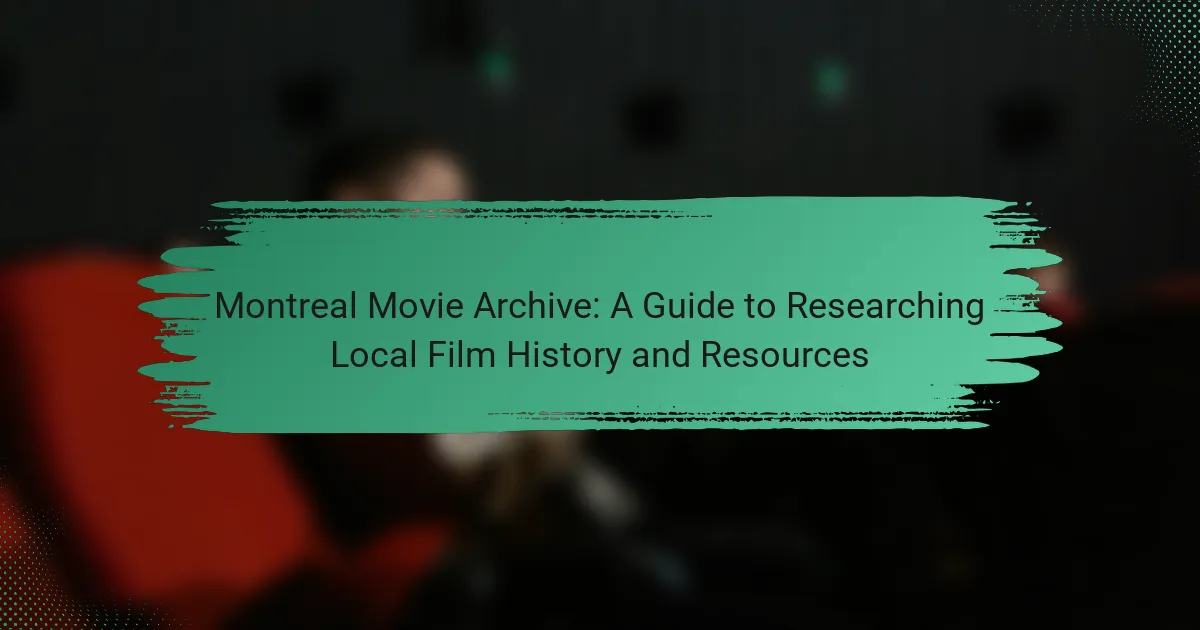The Montreal Movie Archive is a dedicated collection that preserves and showcases films integral to Montreal’s cinematic history. It serves as a valuable resource for researchers, filmmakers, and the general public interested in local film heritage, offering access to various formats, including films, documents, and photographs. The archive supports the study and appreciation of Montreal’s contributions to cinema through its extensive resources, which include historical records, film scripts, and educational workshops. Best practices for utilizing the archive emphasize familiarizing oneself with its catalog, planning visits, and engaging with staff for guidance, ensuring an efficient and productive research experience.

What is the Montreal Movie Archive?
The Montreal Movie Archive is a collection dedicated to preserving and showcasing films related to Montreal’s cinematic history. It serves as a resource for researchers, filmmakers, and the public interested in local film heritage. The archive includes various formats, such as films, documents, and photographs. It aims to support the study and appreciation of Montreal’s contributions to cinema. Established by local film enthusiasts and historians, it plays a crucial role in documenting the evolution of film in the region. The archive also collaborates with educational institutions for research and outreach programs. Access to the collection is available for those interested in exploring Montreal’s film narrative.
How was the Montreal Movie Archive established?
The Montreal Movie Archive was established in 1992. It was created to preserve and promote the film heritage of Montreal and Quebec. The initiative came from a group of film enthusiasts and professionals. Their goal was to collect, catalog, and digitize local films. The archive serves as a resource for researchers and the public. It aims to support the study of local film history. Over the years, the archive has expanded its collections significantly. It now includes various formats and genres of film.
What are the key milestones in the history of the Montreal Movie Archive?
The Montreal Movie Archive was established in 1990. It aimed to preserve and promote Quebec’s film heritage. In 1995, the Archive began digitizing its collection. This initiative increased accessibility to historical films. In 2005, the Archive launched its online platform. This platform allowed users to access a wider range of films. In 2010, the Archive celebrated its 20th anniversary with a special exhibition. This event showcased key films from its collection. In 2015, the Archive expanded its educational programs. These programs aimed to engage the community with local film history.
Who were the founders and key figures behind the Montreal Movie Archive?
The Montreal Movie Archive was founded by a group of dedicated film historians and archivists. Key figures include Pierre Hébert, who played a crucial role in establishing the archive’s mission. Another prominent figure is Marie-Josée Gagnon, known for her contributions in film preservation. The archive’s establishment aimed to document and preserve Montreal’s rich cinematic history. Their collective efforts have significantly impacted local film research and education.
Why is the Montreal Movie Archive important for film history?
The Montreal Movie Archive is important for film history because it preserves and showcases the region’s cinematic heritage. It houses a vast collection of films, documents, and artifacts related to Montreal’s film industry. This archive provides researchers and filmmakers access to unique historical materials. It highlights the contributions of local filmmakers and the evolution of film in the area. The archive also facilitates public engagement with film history through screenings and educational programs. Its preservation efforts ensure that significant local films are not lost to time. Additionally, the archive serves as a vital resource for understanding cultural and social contexts in which these films were made.
What role does the archive play in preserving local film culture?
The archive plays a crucial role in preserving local film culture by safeguarding historical films and related materials. It acts as a repository for films that reflect the region’s unique storytelling and artistic expression. By collecting and maintaining these films, the archive ensures that future generations can access and study local cinematic heritage. Additionally, it provides resources for researchers, filmmakers, and educators interested in local film history. The archive also hosts screenings and events that promote awareness and appreciation of local films. This engagement fosters community involvement and supports the local film industry. Overall, the archive is essential for documenting and celebrating the rich tapestry of local film culture.
How does the archive contribute to the understanding of Montreal’s cinematic landscape?
The archive enhances the understanding of Montreal’s cinematic landscape by preserving historical films and documents. It serves as a repository for local filmmakers’ works. The archive provides access to rare footage and scripts that reflect Montreal’s film culture. Researchers can study these materials to analyze trends in local cinema. The archive also hosts events that promote discussions on Montreal’s film history. This engagement fosters community awareness and appreciation for local cinema. Furthermore, the archive collaborates with educational institutions to support film studies. These initiatives contribute to a deeper understanding of the city’s cinematic evolution.

What resources are available at the Montreal Movie Archive?
The Montreal Movie Archive offers a variety of resources for film research. These include a vast collection of films, including both feature films and documentaries. Researchers can access historical records related to local filmmakers and film productions. The archive also provides access to film scripts and production notes. Additionally, there are resources for studying film theory and criticism. The facility hosts screenings and educational workshops. Researchers can utilize online databases for remote access to materials. All these resources support the study of Montreal’s film history.
What types of materials can be found in the Montreal Movie Archive?
The Montreal Movie Archive contains various types of materials related to film history. These include film reels, photographs, scripts, and production notes. Additionally, the archive holds promotional materials such as posters and flyers. It also features audiovisual recordings, including interviews and documentaries. Research reports and historical documents about local filmmakers are part of the collection. The archive serves as a resource for studying the development of cinema in Montreal. These materials are essential for researchers and film enthusiasts alike.
How can researchers access films and documents within the archive?
Researchers can access films and documents within the Montreal Movie Archive by visiting the archive in person. They may need to schedule an appointment in advance. Access to certain materials might require prior approval from the archive staff. Researchers should check the archive’s official website for specific access guidelines. The website provides detailed information on available collections and any restrictions. Additionally, researchers can inquire about digital access options for some materials. It is advisable to prepare specific queries to facilitate the research process.
What are the unique collections housed in the Montreal Movie Archive?
The Montreal Movie Archive houses several unique collections. These include the Canadian Film Collection, which features films produced in Canada. The Quebec Cinema Collection focuses specifically on films made in Quebec. Another significant collection is the International Cinema Collection, showcasing global films with a connection to Montreal. Additionally, the Archive holds a Historical Film Collection, preserving films that document Montreal’s history. Each collection contains rare footage and materials essential for research and education. These unique collections support the study of local and national film history.
How can the Montreal Movie Archive assist filmmakers and researchers?
The Montreal Movie Archive assists filmmakers and researchers by providing access to a vast collection of local films. This collection includes historical footage, documentaries, and independent films. Filmmakers can utilize these resources for inspiration and reference. Researchers benefit from the archive’s extensive cataloging of film history in Montreal. The archive also offers support through workshops and educational programs. These initiatives help users understand the significance of local cinema. Additionally, the archive collaborates with various institutions to enhance film preservation efforts. This collaboration ensures that Montreal’s film heritage is maintained for future generations.
What services does the archive offer to support film research?
The archive offers a variety of services to support film research. These include access to a vast collection of films, scripts, and production materials. Researchers can utilize archival databases for locating specific films and related documentation. The archive also provides research assistance from knowledgeable staff members. Additionally, it offers workshops and events focused on film history and preservation. Researchers can request screenings of films in the collection for study purposes. The archive’s resources are designed to facilitate both academic and personal film research endeavors.
How can one utilize the archive for academic purposes?
One can utilize the Montreal Movie Archive for academic purposes by accessing its extensive collection of local film materials. Researchers can find primary sources, such as films, scripts, and production documents. These materials provide insights into the historical context of Montreal’s film industry. Scholars can analyze trends and themes in local cinema through the archive’s resources. The archive also offers access to rare footage and interviews with filmmakers. This information can support academic papers and presentations. Utilizing the archive enhances the depth of research in film studies. It fosters a better understanding of Montreal’s cultural contributions to cinema.

What are the best practices for researching at the Montreal Movie Archive?
The best practices for researching at the Montreal Movie Archive include familiarizing yourself with the archive’s catalog. This catalog provides access to a wide range of films, documents, and resources. It is essential to identify specific topics or films of interest beforehand. Planning your visit can maximize efficiency and access to materials. Utilize the archive’s staff for guidance and assistance. They have expertise in navigating the collection. Take advantage of available workshops or training sessions offered by the archive. These sessions often cover research techniques and tools. Make sure to review the archive’s policies on access and usage of materials. Understanding these rules ensures compliance during your research. Finally, document your findings meticulously for future reference. This practice aids in organizing and synthesizing the information gathered.
What steps should researchers take before visiting the archive?
Researchers should conduct preliminary research on the archive’s collections. This includes identifying specific films, directors, or historical periods of interest. They should consult the archive’s online catalog or database for available materials. It’s essential to check the archive’s visiting hours and any access restrictions. Researchers should also prepare a list of questions or topics to explore during their visit. Understanding the archive’s policies on handling materials is crucial. Additionally, contacting archive staff in advance can provide valuable insights. These steps ensure a productive and efficient research visit.
How can researchers prepare a list of materials to explore?
Researchers can prepare a list of materials to explore by identifying relevant sources and categorizing them effectively. They should start by defining their research focus within local film history. Next, researchers can gather materials from archives, libraries, and online databases specific to Montreal’s film scene. Utilizing bibliographies and existing literature can help identify key texts and resources. Engaging with local film organizations and historians can provide additional insights and recommendations. Lastly, researchers should organize the materials by type, such as books, articles, and audiovisual content, to facilitate easy access during the research process.
What tools and resources should researchers bring for effective study?
Researchers should bring a laptop or tablet for note-taking and accessing digital resources. These devices allow for efficient data organization and retrieval. A reliable internet connection is essential for online research. Additionally, researchers should carry external hard drives or USB drives for data backup. Notebooks and pens are useful for jotting down quick thoughts and observations. Reference books related to film history enhance understanding of the subject. Access to academic journals and databases provides valuable scholarly articles. Lastly, a camera or smartphone can document findings or capture relevant materials.
What tips can enhance the research experience at the Montreal Movie Archive?
Utilizing the Montreal Movie Archive effectively requires specific strategies. Start by familiarizing yourself with the archive’s catalog system. This system includes detailed descriptions of available films and documents. Next, plan your visit by identifying key resources relevant to your research topic. Engaging with the staff can provide valuable insights and guidance. They are knowledgeable about the collection and can assist in locating specific materials. Additionally, take advantage of any workshops or events hosted by the archive. These often offer deeper understanding and networking opportunities. Lastly, be prepared to take notes and document your findings thoroughly. This practice will help you organize your research efficiently.
How can networking with archive staff improve research outcomes?
Networking with archive staff can significantly enhance research outcomes. Archive staff possess specialized knowledge about the collections. They can guide researchers to relevant materials that may not be readily accessible. This personalized assistance can save time and increase efficiency. Additionally, staff can provide insights into the context and provenance of materials. Their expertise often includes knowledge of related resources and connections to other institutions. Engaging with them can lead to discovering unique documents or artifacts. Collaborating with archive staff ultimately enriches the research process and results.
What common challenges do researchers face, and how can they be addressed?
Researchers commonly face challenges such as limited access to archival materials, insufficient funding, and time constraints. Limited access to archival materials can hinder research progress. This often occurs due to restricted hours, preservation policies, or geographical barriers. Insufficient funding restricts researchers from obtaining necessary resources or traveling to archives. Time constraints arise from deadlines or competing responsibilities, impacting the depth of research.
To address these challenges, researchers can utilize digital archives to access materials remotely. Collaborating with institutions can provide additional funding and resources. Prioritizing tasks and setting realistic timelines can help manage time effectively. Networking with other researchers can also lead to shared resources and insights. These strategies collectively enhance the research process and mitigate common challenges faced by researchers.
The Montreal Movie Archive is a dedicated collection focused on preserving and showcasing films that reflect Montreal’s cinematic history. Established in 1992 by film enthusiasts and historians, the archive serves as a vital resource for researchers, filmmakers, and the public, offering access to a diverse range of films, documents, and photographs. Key milestones in its development include digitization efforts, the launch of an online platform, and the expansion of educational programs. The archive plays a crucial role in documenting local film culture, providing unique materials for research, and facilitating public engagement through screenings and workshops. Researchers can access the archive’s resources both in-person and digitally, making it an essential hub for studying Montreal’s film heritage.


